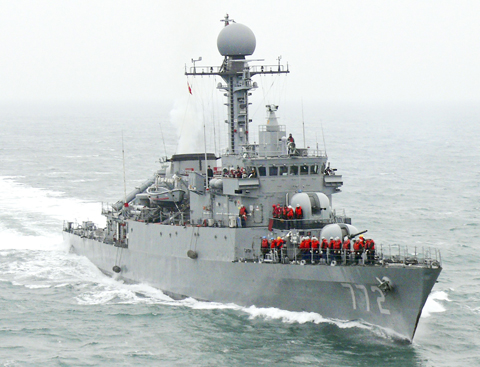North Korea accused South Korea yesterday of spreading false rumors that the North was to blame for the mysterious explosion that sank a southern warship near the tense sea border.
North Korean officials have denied involvement in the blast that broke the 1,200 tonne Cheonan into two pieces March 26 during a routine patrol near sea border, killing at least 38.
South Korean officials have not openly blamed the North for one of its worst naval disasters, but an investigator said on Friday the explosion was most likely external.

PHOTO: REUTERS
Officials have not ruled out a North Korean floating mine or torpedo in the disputed border waters where three past inter-Korean naval battles have been fought.
The North’s official Korean Central News Agency yesterday carried a commentary by an unidentified North Korean military commentator saying Seoul is spreading rumors.
“The military warmongers are getting more undisguised in their moves to link the accident with the North, though it was caused by their fault,” the commentator said.
The commentator accused the South of seeking to blame North Korea in order to strengthen the ruling party’s position in upcoming local elections and shore up international sanctions against the North.
The UN Security Council slapped on tough new sanctions on North Korea following its second nuclear test last year.
The divided peninsula remains technically at war, since the 1950-1953 Korean War ended in a ceasefire, not a peace treaty.
The state media commentary marked the first official North Korean response to the sinking. Previously, North Korean officials had been reported by South Korean media as privately assuring Chinese officials the North’s military had no part in the disaster.
North Korea’s accusation came a day after chief South Korean investigator Yoon Duk-yong told reporters after examining the ship that there was a “high possibility of an external explosion” that sunk the ship.
Fifty-eight of the ship’s crew were rescued while the ship was sinking and 38 bodies have been found, most of them on Thursday when the stern was raised from the water. Eight crew members are still unaccounted for.

In the sweltering streets of Jakarta, buskers carry towering, hollow puppets and pass around a bucket for donations. Now, they fear becoming outlaws. City authorities said they would crack down on use of the sacred ondel-ondel puppets, which can stand as tall as a truck, and they are drafting legislation to remove what they view as a street nuisance. Performances featuring the puppets — originally used by Jakarta’s Betawi people to ward off evil spirits — would be allowed only at set events. The ban could leave many ondel-ondel buskers in Jakarta jobless. “I am confused and anxious. I fear getting raided or even

Kemal Ozdemir looked up at the bare peaks of Mount Cilo in Turkey’s Kurdish majority southeast. “There were glaciers 10 years ago,” he recalled under a cloudless sky. A mountain guide for 15 years, Ozdemir then turned toward the torrent carrying dozens of blocks of ice below a slope covered with grass and rocks — a sign of glacier loss being exacerbated by global warming. “You can see that there are quite a few pieces of glacier in the water right now ... the reason why the waterfalls flow lushly actually shows us how fast the ice is melting,” he said.

Eleven people, including a former minister, were arrested in Serbia on Friday over a train station disaster in which 16 people died. The concrete canopy of the newly renovated station in the northern city of Novi Sad collapsed on Nov. 1, 2024 in a disaster widely blamed on corruption and poor oversight. It sparked a wave of student-led protests and led to the resignation of then-Serbian prime minister Milos Vucevic and the fall of his government. The public prosecutor’s office in Novi Sad opened an investigation into the accident and deaths. In February, the public prosecutor’s office for organized crime opened another probe into

RISING RACISM: A Japanese group called on China to assure safety in the country, while the Chinese embassy in Tokyo urged action against a ‘surge in xenophobia’ A Japanese woman living in China was attacked and injured by a man in a subway station in Suzhou, China, Japanese media said, hours after two Chinese men were seriously injured in violence in Tokyo. The attacks on Thursday raised concern about xenophobic sentiment in China and Japan that have been blamed for assaults in both countries. It was the third attack involving Japanese living in China since last year. In the two previous cases in China, Chinese authorities have insisted they were isolated incidents. Japanese broadcaster NHK did not identify the woman injured in Suzhou by name, but, citing the Japanese